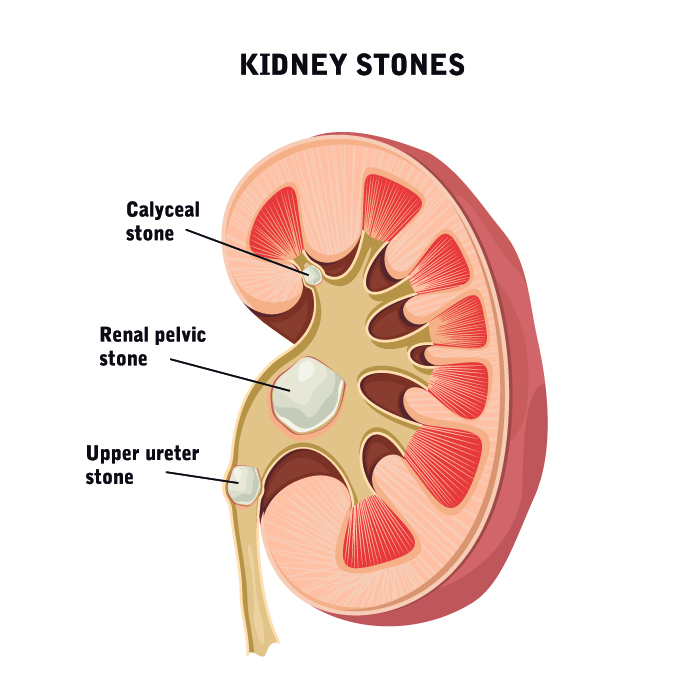Kidney stone Treatment & Diagnostics in Chunni Ganj, Kanpur
Kidney stone
Kidney stones or renal calculi or nephrolithiasis are deposits of minerals that have hardened within the excretory system. Some of the common symptoms of kidney stones are sharp, shooting pain below the ribs, burning sensation on urination, pink, or brown tinged urine and cloudy or smelly urine.
What exactly are kidney stones?
Kidney stones are small, hard solid masses located anywhere throughout the urinary system. They are most commonly found in the kidneys. They may be located at various locations like kidneys, ureter, bladder, or urethra.

Are there different types of kidney stones?
Depending on what they contain, there are a few different types:
- Calcium: These kidney stones are made of calcium oxalate, calcium phosphate or calcium maleate. They are mainly from oxalate-rich foods like peanuts, spinach, potato chips and chocolates.
- Uric acid: This type of kidney stone is usually seen when one has acidic urine. Gout or chemotherapy could be other reasons. High amounts of purine is the main cause.
- Cystine: Cystine is a naturally occurring amino acid in the body. Cystine stones are seen when one has a genetic condition called cystinuria.
- Struvite: Struvite stones are more common in women especially those with prolonged urinary tract infections (UTIs).
What are the commonly observed symptoms of kidney stones?
Kidney stones usually go undetected unless they get displaced from their original location. They often migrate into the ureter, which is the tube connecting the bladder and kidney. This causes urine retention and severe pain. Some of the common symptoms are:
- Sharp, shooting pain due to ureter spasm.
- Radiating pain from abdomen to the lower abdomen, leading to the groin.
- Burning sensation while urinating.
- A constant urge to urinate and urinating small amounts which the urge hits.
- Pinkish or reddish urine
- Foul-smelling urine, especially if there is infection.
- Fever, chills and vomiting if there is persistent infection.
How would my doctor find out if I have a kidney stone?
Diagnosis of a kidney stone is done by a thorough physical exam, patient history and various tests. Let us take a look at the tests required:
- Blood test: The basic requirement to know blood levels of calcium, uric acid, phosphorus, and other substances.
- Creatinine and BUN (blood urea nitrogen) levels to check the functioning of the kidney.
- Urinalysis or urine test to detect the presence of excess crystals, bacteria, and blood cells.
- Imaging: One may also go for abdominal X-ray, ultrasound, and CT scans in case of small stones.
When to see a doctor at Apollo Spectra, Kanpur?
Most of the time, kidney stones are undetected, unless there are symptoms. One must consult a doctor if:
- There is severe pain.
- Pain along with fever, nausea, and vomiting
- Blood-tinged urine
- Urine retention or difficulty in passing urine.
If you notice any of these symptoms, make sure you schedule an appointment at the earliest.
Request an appointment at Apollo Spectra Hospitals, Kanpur
Call 1860-500-2244 to book an appointment
How are kidney stones treated at Apollo Spectra, Kanpur?
Once the presence of kidney stones is established, and their size, number and position are located, the doctor may recommend the following modes of treatment, depending on their size:
- If the stone is small:
Drink lots of water: In the case of small stones, drinking lots of water will flush them out.
Pain killers: If the pain is unbearable, the doctor may prescribe a pain reliever.
Mediation: The doctor may also prescribe medicines that help eliminate the stone faster and with less pain. These are usually alpha-blockers that relax the bladder muscles.
- If the stone is not small:
Sound waves: one of the modes of treatment is to use sound waves in a therapy called extracorporeal shock wave lithotripsy to break them down so that they can pass in the urine.
Surgery: nephrolithotomy is the procedure where the stones are surgically removed with small incisions.
Another surgical procedure is ureteroscopy where the stone is removed with a scope.
Conclusion:
Kidney stones are a relatively common problem, especially among women. They can be easily treated, and one need not panic in case of their presence. A well-balanced diet, adequate water and exercising caution while eating high-salt foods is important to prevent them.
When the stone is about to pass, there will be a sharp pain in the lower abdominal area and groin.
It is recommended to drink plenty of water and stay active to help the stone pass.
Kidney stones up to a size of 4mm may pass through on their own, with excess water, but anything bigger would need assistance from the doctor.
Symptoms
Our Top Specialities
NOTICE BOARD
CONTACT US
CONTACT US
 Book Appointment
Book Appointment


.svg)
.svg)
.svg)
.svg)








